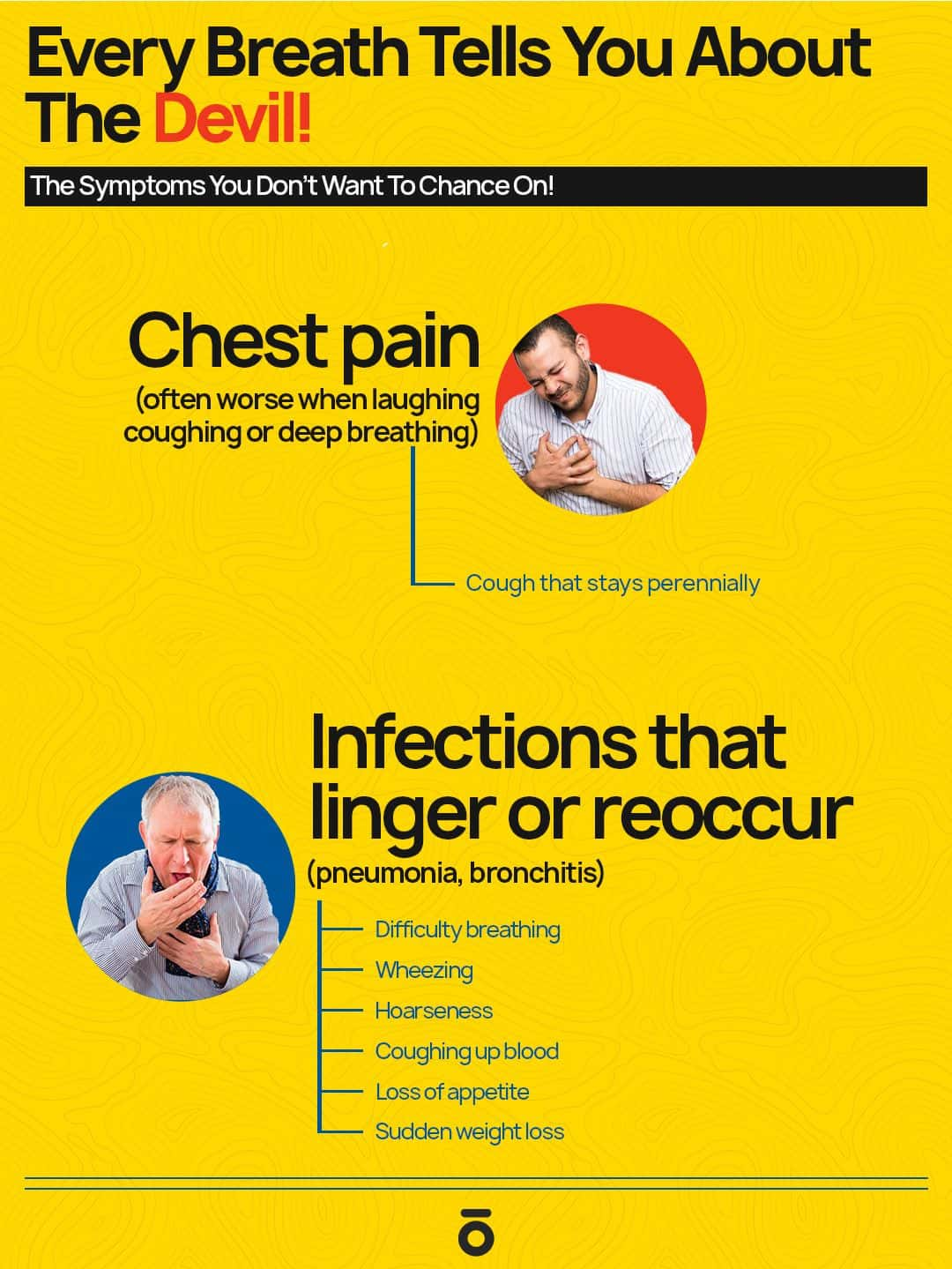7 Essential Facts You Should Know About Lung Cancer

Introduction
Introducing lung cancer or lung carcinoma - a malignant tumour that starts to develop in the lungs. This happens when cells in the lung mutate and grow unchecked, forming tumours that destroy healthy lung tissue. It is usually caused by genetic damage to the DNA of lung cells, brought about by smoking or inhaling harmful chemicals.
When it comes to symptoms and lung cancer diagnosis, there are many. First, you start coughing - this isn’t your regular cold and cough, but a cough that doesn’t go away. Then there are issues with breathing, chest pain, hoarseness, inexplicable weight loss, shoulder pain, and swelling in the face, neck, and arms or upper chest.
There are ways you can prevent lung cancer, namely stopping smoking, implementing tobacco control policies, addressing occupational hazards and bringing down air pollution levels.

7 Things to Know
Lung Cancer Remains the 4th Leading Cause of Cancer-Related Deaths in India
If anyone has any doubts about how dangerous lung cancer is, you must know that lung cancer remains the 4th most common cause of cancer-related deaths in India. In India, there are around 63,000 new lung cancer cases reported each year. Lung cancer is the fourth most common cancer in India, accounting for around 5.9% of all cancer cases in the country.
However, this is not just a smoker’s disease. In one study of around 975 patients with non-small-cell lung cancer in Singapore, around 31.5% of males and 68.5% of female patients had never smoked.
There Are Two Main Types of Lung Cancer
The most common type is non-small-cell lung cancer, which makes up the majority of cases. Adenocarcinoma, squamous cell carcinoma, large cell carcinoma and large cell neuroendocrine tumours are considered to be part of this group.
A less common but highly aggressive type of lung cancer that tends to spread faster is small-cell lung cancer. Small cell lung cancer usually happens in people who have been heavy smokers for years. There are two different kinds of small cell lung cancer - small cell carcinoma and mixed small cell/large cell cancer or combined small cell lung cancer.
Smoking Remains the Leading Cause of lung cancer
Smokers - this one’s bad news for you. Smoking remains the primary risk factor for lung cancer, responsible for around 85% of cases. However, non-smokers may also develop lung cancer thanks to factors like second-hand smoke exposure, genetic predisposition, air pollution and certain occupational hazards.
The horrible chemicals in tobacco smoke damage the cells in the lungs, resulting in abnormal cell growth, which can later become cancerous. Quitting smoking at any age can greatly reduce the risk of developing this deadly disease and improve your overall health.
Detecting This Cancer Early Can Save Lives
Sadly, we only diagnose lung cancer in its later stages when it gets progressively harder to treat the disease. Finding out the disease at the early signs of lung cancer is important. Detecting this cancer early can greatly improve your chances of survival.
Screening methods, like low-dose CT scans, are available for high-risk individuals, like long-term smokers, to detect lung cancer at earlier and more treatable stages. In its primary stages, lung cancer may be confined to the lungs and easier to treat with surgery, targeted therapies or radiation.
Sadly, lung cancer doesn’t give you too many symptoms in its early stages, which is why regular screenings should be the norm.
The Symptoms of Lung Cancer Are Subtle
Sadly, early-stage lung cancer doesn’t cause very noticeable symptoms. There might not even be a cough to start with. Symptoms appear as the cancer progresses. If you have any symptoms, don’t mistake them for a common cold or bronchitis. It could be something serious.
Treatment Depends on the Type or Stages of Lung Cancer
Treatment for lung cancer depends on the type, whether it is non-small-cell lung cancer or small-cell lung cancer, at which stage the disease has been identified, as well as overall patient health.
Usually, treatment involves surgically removing the tumour or part of the lung, targeting cancer with high-energy radiation, administering drugs to kill cancer cells or stop their growth, and immunotherapy and targeted therapy so the immune system can fight cancer effectively.
Prevention and Risk Reduction are Important
It is highly important that you stay away from cigarettes, no matter what. Smoking isn’t cool, and if someone has told you that it is, that person needs a reality check. Harmful chemicals are second in line - stay away from sources of radon if possible because exposure can cause lung cancer.
And finally, those who are exposed to asbestos - try to reduce your exposure so as to bring down the risk factor of developing lung cancer.

Conclusion
In conclusion, lung cancer remains one of the most deadly diseases out there, with risk factors like smoking and exposure to harmful chemicals. Try not to pick up a bad habit and bring down your exposure to carcinogens.
Lung cancer treatment options are multiple in case you get diagnosed. Remember, as is the case with lung cancer and everything else - prevention is better than cure.
FAQs
I'm a non-smoker. Will I get lung cancer?
While smokers are the primary risk group for lung cancer, people who are exposed to harmful chemicals are at risk of getting this deadly disease.
If I quit smoking, will I still get lung cancer?
If you quit smoking now, then your chances of developing lung cancer fall. The sooner you quit, the better for you.
What are the symptoms of lung cancer?
The symptoms of lung cancer are very subtle, surfacing only when the cancer has progressed to an advanced stage. You have a persistent cough, shortness of breath or wheezing, chest pain, fatigue, unexplained weight loss, coughing up blood and hoarseness.
How is lung cancer diagnosed?
Lung cancer is picked out using a combination of tests, like X-rays, CT scans and PET scans to check for tumours, biopsy to take out a tissue for analysis to confirm the presence of cancer, sputum cytology to examine mucous coughed up, and blood and pulmonary function tests.
Who is at risk for lung cancer?
People who are at higher risk of getting lung cancer include smokers, second-hand smokers, people residing in areas with increased levels of air pollution, workers exposed to asbestos and people with a family history of lung cancer.






